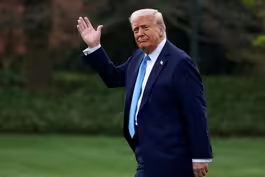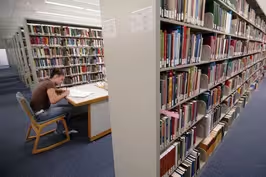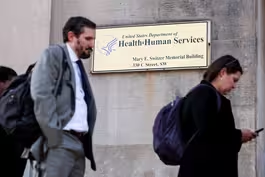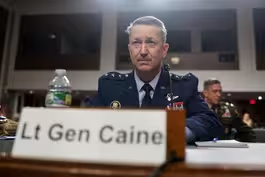
Professor explains why he's leaving Yale amid Trump threats
Clip: 4/1/2025 | 6m 42sVideo has Closed Captions
Professor explains why he's leaving Yale for Toronto as colleges react to Trump's threats
Princeton University said several dozen of its federal grants have been halted. It's just the latest Trump administration move targeting colleges. Partly in response, Yale philosophy professor Jason Stanley announced he’s leaving not only his school, but the country, to teach at the University of Toronto. Stanley joined Amna Nawaz to discuss his decision.
Problems playing video? | Closed Captioning Feedback
Problems playing video? | Closed Captioning Feedback
Major corporate funding for the PBS News Hour is provided by BDO, BNSF, Consumer Cellular, American Cruise Lines, and Raymond James. Funding for the PBS NewsHour Weekend is provided by...

Professor explains why he's leaving Yale amid Trump threats
Clip: 4/1/2025 | 6m 42sVideo has Closed Captions
Princeton University said several dozen of its federal grants have been halted. It's just the latest Trump administration move targeting colleges. Partly in response, Yale philosophy professor Jason Stanley announced he’s leaving not only his school, but the country, to teach at the University of Toronto. Stanley joined Amna Nawaz to discuss his decision.
Problems playing video? | Closed Captioning Feedback
How to Watch PBS News Hour
PBS News Hour is available to stream on pbs.org and the free PBS App, available on iPhone, Apple TV, Android TV, Android smartphones, Amazon Fire TV, Amazon Fire Tablet, Roku, Samsung Smart TV, and Vizio.
Providing Support for PBS.org
Learn Moreabout PBS online sponsorshipAMNA NAWAZ: The Trump administration said yesterday it's reviewing about $9 billion in federal grants to Harvard, citing the school's response to antisemitism.
And, today, Princeton said several dozen of its federal grants had been halted.
They are just the latest moves targeting colleges.
Last week, Columbia agreed to policy changes after the administration pulled $400 million in federal funding.
Partly in response, Yale University philosophy professor Jason Stanley announced he's leaving not only his school, but the country, to teach at the University of Toronto in Canada.
Stanley said he's making the move so he can -- quote -- "raise his kids in a country that's not tilting towards a fascist dictatorship."
For more on his decision, Jason Stanley joins me now.
Professor Stanley, welcome to the "News Hour."
Thanks for joining us.
JASON STANLEY, Yale University: Thank you for having me on.
AMNA NAWAZ: So you have authored two books on fascism.
It's a topic you spend a lot of time studying.
Your decision to leave has been framed as you fleeing the U.S. That's the word people are using.
Is that how you see it?
JASON STANLEY: No, but that has resonance with Jewish intellectuals fleeing Nazi Germany in the 1930s, so it's kind of interesting to see the use of that word.
I made my decision for both political reasons and personal reasons.
It's clear to me that it's time to go for an academic and a critic of the Trump administration who has the privilege to have an opportunity to leave.
AMNA NAWAZ: We have seen universities come under attack of this administration.
Is this just -- your decision, is it just about what you have seen happening at universities and colleges?
JASON STANLEY: Well, that was what sealed it.
I had an offer from the University of Toronto and had gone back and forth about the offer.
I had thought -- I'd assigned like 50 percent probability to taking it.
But when Columbia folded, that's when I thought, OK, I'm just going to look at the probabilities of our institutions folding, of our democratic institutions folding.
And by that, I mean not just the universities, but the media and our legal system.
And I thought, well, maybe they can hold the line, but this is an opportunity.
It's a great opportunity.
And I think the probabilities are not in the favor of U.S. democracy.
AMNA NAWAZ: If Columbia had responded differently, what do you think would be different now?
In other words, what would you have wanted Columbia to do?
JASON STANLEY: I would have wanted all of our universities to collectively band together and loudly call B.S.
on the charge that somehow intellectuals and universities by allowing free speech and protest are threatening Jewish students.
AMNA NAWAZ: And why do you think they didn't do that and universities aren't doing that now.
JASON STANLEY: I mean, I think one reason is that they don't see the situation for what it is.
They don't see the antisemitism charge as just an excuse.
And I would like universities to see that this is a war, that the Trump administration is going to take -- try to take them down come what may.
It just doesn't matter what excuse they use.
So to watch these universities sit there and go, oh, this is such a -- $9 billion for antisemitism, when there were many, many Jewish students in the anti-war protests who are somehow being erased both by the media, the Trump administration, and the universities.
So they're kind of acting like hostages who are sort of repeating the lines that they're told.
So I would like to see them band together collectively and recognize what they're facing, which is a war.
AMNA NAWAZ: Universities also argue that the threat of these funding cuts are really existential in some cases.
They wouldn't be allowed to continue to do the work if those cuts came through.
Isn't there something to that, they have an obligation to survive?
JASON STANLEY: No, there's no survival.
A university is a democratic institution.
And if you give up the democratic nature of a university, then there's no university there.
There's a name and some buildings.
And that's what we risk.
Sure, you could leave some names and a building, but that's not the survival of a university.
AMNA NAWAZ: At the same time, Professor Stanley, this is the country you were born in.
It's the country you call home.
It's a university you have worked at for more than a decade.
If you believe in this democratic system and this country, why not stay?
Why not do all you can to defend it?
JASON STANLEY: Well, believe me, I will be doing a lot to defend it in Toronto, where we're going to be organizing to defend democracies.
But this administration wants me to love my country like the National Socialists wanted Germans to love Germany, because it's a powerful nation that can punch other nations in the nose.
That's not why I love my country.
I love my country because we don't have kings.
And if my country decides to adopt a king, then it's no longer really my country.
Like, if universities decide that they're no longer going to allow protest, free speech, critical inquiry into history, they're no longer universities.
AMNA NAWAZ: You also have two young children.
So I wonder what you're telling them about why you're moving to a different country?
JASON STANLEY: Well, my kids are Black and Jewish.
So there's a lot of issues for facing.
But I'm telling them, you're American.
We love our country.
Our -- you have lots of family here.
But these are risky conditions.
My parents are Holocaust survivors.
This is something that my family has discussed.
My kids are not politically ignorant.
They can recognize what's going on.
AMNA NAWAZ: Do you expect that you will come back?
JASON STANLEY: It's very hard to move as an academic.
But this is my home.
I hope our universities fight back.
But I'm going to do whatever I can to help American democracy wherever I am.
AMNA NAWAZ: That's Professor Jason Stanley, currently with Yale University, soon to be of the University of Toronto, joining us tonight.
Professor Stanley, thank you.
Good to speak with you.
JASON STANLEY: Thank you.
After quake, aid groups warn Myanmar has overwhelming need
Video has Closed Captions
Clip: 4/1/2025 | 3m 44s | After quake, aid groups warn Myanmar has overwhelming need for food, water and health care (3m 44s)
Businesses brace for Trump’s tariffs as Democrats push back
Video has Closed Captions
Clip: 4/1/2025 | 2m 44s | Businesses brace for Trump’s new tariffs while Senate Democrats try to push back (2m 44s)
How food aid made it hard for Haiti to produce its own
Video has Closed Captions
Clip: 4/1/2025 | 10m 13s | How efforts to send Haiti cheap rice made it hard for the nation to produce its own (10m 13s)
The impact of private equity's expansion into health care
Video has Closed Captions
Clip: 4/1/2025 | 7m 3s | The impact of private equity's expansion into health care (7m 3s)
Library and museum support agency faces massive cuts
Video has Closed Captions
Clip: 4/1/2025 | 6m 15s | Library and museum support agency faces massive cuts after Trump order (6m 15s)
Mass firings begin at government health agencies
Video has Closed Captions
Clip: 4/1/2025 | 4m 13s | Mass firings begin at government health agencies, including FDA, CDC and NIH (4m 13s)
Trump's Joint Chiefs pick faces questions from senators
Video has Closed Captions
Clip: 4/1/2025 | 4m 27s | Trump's pick to lead Joint Chiefs tells senators he would stay out of politics (4m 27s)
Providing Support for PBS.org
Learn Moreabout PBS online sponsorship
- News and Public Affairs

FRONTLINE is investigative journalism that questions, explains and changes our world.

- News and Public Affairs

Amanpour and Company features conversations with leaders and decision makers.












Support for PBS provided by:
Major corporate funding for the PBS News Hour is provided by BDO, BNSF, Consumer Cellular, American Cruise Lines, and Raymond James. Funding for the PBS NewsHour Weekend is provided by...






